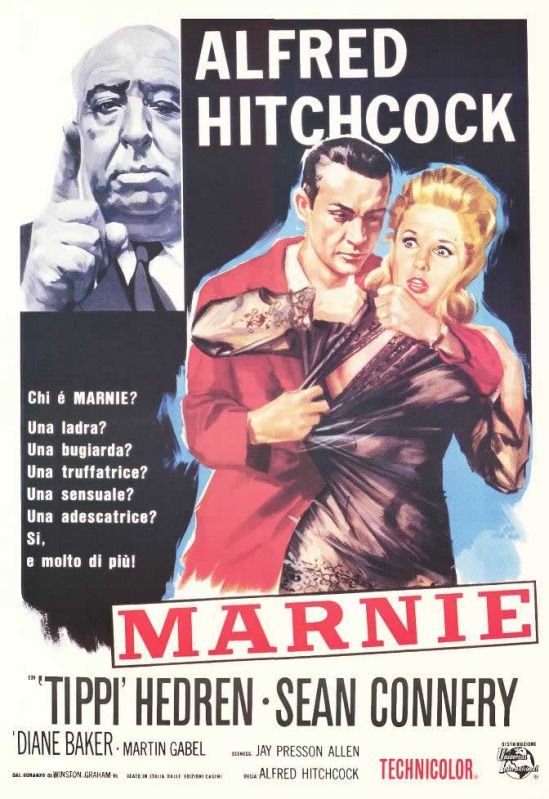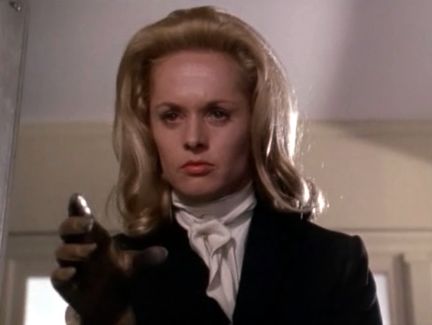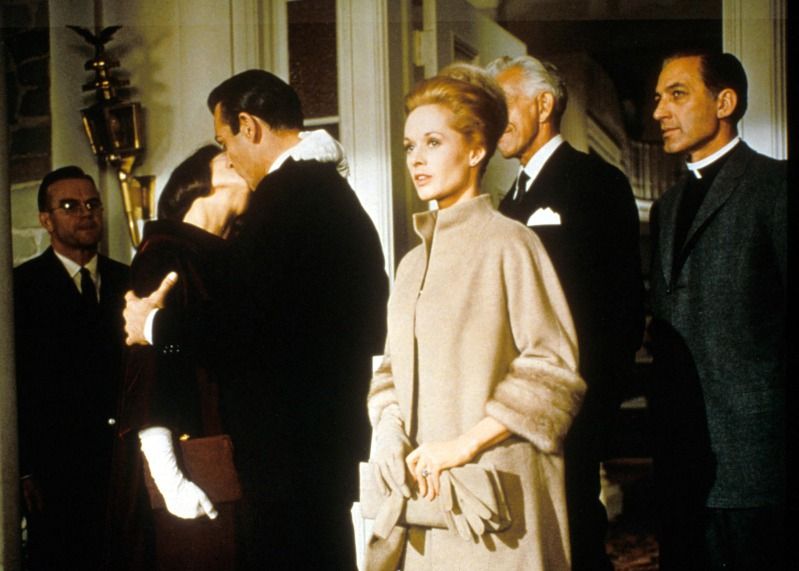 |
| Yeah, this poster pretty much sums up the movie. |
Marnie 1964
Director: Alfred Hitchcock
Starring: Sean Connery, Tippi Hedren
Everyone makes a such a big to-do about Hitchcock’s glory period, late fifties to mid sixties, when he produced a string of unquestionable masterpieces. However, no artist, especially not one as prolific as Hitchcock, can produce such great films without having a stinker every now and then. Enter Marnie, a great reminder that not everything made in that period belongs in a “Best Of” list.
Marnie tells the story of a beautiful thief and con artist, the eponymous Marnie (Hedren), who both loves and hates her mother and appears to have nervous breakdowns when she sees the color red. On her latest job, she gets caught, or should I say cornered, by wealthy zoology enthusiast Mark Rutland (Connery). Inexplicably fascinated with her, he gives her an option: get turned in to the cops with the evidence he’s been collecting on her, or marry him. She decides to make her prison with Mark instead of the cops, and we are then treated, or rather mistreated, to one of the vilest relationships ever and some nonsensical psycho-babble. Fantastic.
I am not a fan of this movie. It has many weaknesses; I was recently struck by how forced the entire film feels. Hitchcock mostly worked prior to the French New Wave takeover of the late sixties, so naturally there’s more of a staged feeling to this film compared to modern films, but even among Hitchcock flicks, this one takes the cake. Never have I felt a filmmaker trying harder in a movie than Hitch in this one. Characterizations are not conveyed through, say, acting performances or pointed lines of dialogue, but through ridiculously over the top musical cues and unnecessarily showy camera zooms and cuts. Dude, I get it. You want me to know that everyone in the film is off their rocker. Back it up with a narrative that makes sense and performances that aren’t duller than dirt, and I’ll believe it; don’t shove it down my throat, Alfred.
I have never found Tippi Hedren to be a particularly gifted actress, and her performance in Marnie is laughable. Lucky girl, she gets to play a crazy, frigid kleptomaniac, but she possesses all the range of my toilet seat. Hedren can play it cool – that’s why Hitchcock was fascinated with her. But the crazy part of the role? Um, no. Marnie is best when she’s coolly pulling off company vault heists and at her pathetic weakest when she’s asked take the bus to Crazy Town. So what does the script do? Spend about thirty minutes on the interesting vault heist bits and the rest of the movie on her psychosis. Poor Tippi.
 |
| This right here is Tippi "acting." Be ready to see this expression on her face for, well, the whole movie. |
It’s one thing to have a ludicrous central relationship with abusive characters; adding insult to injury is the portrayal of the rest of the females in the film. Mark’s sister Lil is worrisome. She has a clearly unhealthy obsession with her brother. When Mark comes home with Marnie, she is cruel and taunting to Marnie, and unsettlingly flirty with her brother. Um, ick. What kind of family is this, anyway? Then there’s Marnie mother, who preaches crazy from the high hills and is a shamelessly tacked-on plot point to emphasize the Virgin/Whore complex that Hitchcock really seems to be going for in this film. There is such a reduction in this movie of women to the basest of those two caricatures, as if all of women’s problems can be reduced down to this simple point. We are, apparently, either coldly frigid or whores, but don’t worry ladies, we just need a sadistic man to come along to psychoanalyze us and solve all our problems for us. Oh, and don’t go trying to help out your fellow sister. Apparently, we all hate one another wildly. Even the little girl in the film is vicious and conniving. Really, Hitchcock? You hate us that much?
 |
| That chick he's kissing? That's his sister. Exactly. |
The more I write about this movie, the angrier I get about it. I feel dirty and queasy after watching it. It’s difficult for me to think of a reason to watch it. There’s a nice sequence full of classic Hitchcock suspense, but only one. This is not a suspense film but a cheap attempt at a psychological thriller. It fails miserably, it’s full of wholly detestable characters, the acting is weak, the story is ridiculous, and it’s dangerously misogynistic.
I’ve seen it twice now, and I am DONE watching this film. Never again.
Arbitrary Rating: 2/10. It avoids the lowest possible rating because the story is, at the very least, coherently constructed, however massively distasteful it may be.
See, I don't think this is evidence of a bad film during a great run. I think this film is evidence that the great run of Hitchcock films ended with The Birds.
ReplyDeleteTouche.
Delete